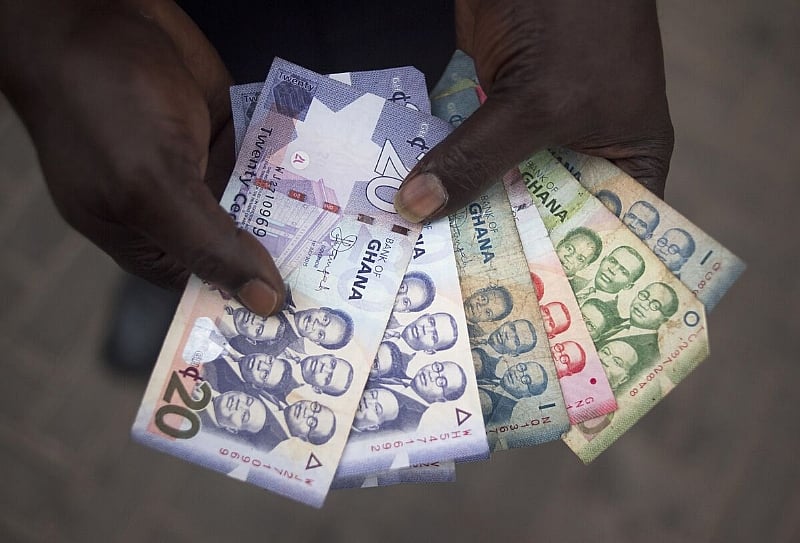The Ghanaian cedi experienced a depreciation against the United States dollar on Monday, February 3, 2025, continuing a trend of weakening against the greenback. The buying rate stood at GHS15.20 per dollar, reflecting a 4 pesewas drop compared to Friday’s average, while the selling rate reached GHS15.67, a decrease of 7 pesewas. This movement indicates a slight increase in the cost of acquiring dollars for individuals and businesses in Ghana. Forex bureaus, which provide currency exchange services outside the formal banking system, offered slightly different rates, with a buying rate of GHS15.45 and a selling rate of GHS15.90. This disparity highlights the variations in exchange rates across different segments of the currency market. The data, sourced from Cedirates.com, a trusted platform for currency and fuel information in Ghana, provides a snapshot of the prevailing exchange rate dynamics in the country.
The interbank market, where banks exchange currencies among themselves, presented a slightly more favorable rate for dollar transactions. The buying rate on the interbank market was GHS15.29, while the selling rate was GHS15.31. This smaller spread between buying and selling rates in the interbank market is typical, reflecting the larger volumes and lower transaction costs associated with interbank trading. Beyond the US dollar, the cedi also faced fluctuations against other major currencies. The British pound averaged GHS18.72 for buying and GHS19.39 for selling, while the euro traded at GHS15.57 for buying and GHS16.22 for selling. These rates underscore the interconnectedness of global currency markets and the influence of various factors on exchange rate movements. The Bank of Ghana’s interbank rates, which serve as a benchmark for the market, were slightly different, with the pound selling at GHS19.01 and the euro trading at GHS15.91.
Money transfer services, such as LemFi and Afriex, offered competitive exchange rates for remittances from the US and the UK to Ghana. Both platforms offered a rate of GHS15.25 per dollar, providing a cost-effective avenue for Ghanaians abroad to send money home. For pound sterling transfers, LemFi offered a rate of GHS19.00, while Afriex offered a slightly higher rate of GHS19.34. For euro transfers, Afriex offered GHS15.89 per euro, and LemFi offered GHS15.65. These specialized remittance services often offer better rates compared to traditional banks due to their streamlined operations and focus on specific currency corridors.
Digital subscription payments for services like Netflix, Spotify, and Apple Music, processed through Visa and Mastercard, incurred slightly higher exchange rates. Visa transactions were processed at GHS16.48 per dollar, while Mastercard transactions were at GHS16.42. This difference likely stems from the varying fees and processing charges levied by the different card networks. These higher rates for digital subscriptions highlight the additional costs associated with international transactions and the impact of currency conversion fees.
Experts attributed the weakening of the British pound and the euro against the cedi to external factors, particularly the impact of then-US President Donald Trump’s policies. His protectionist stance and trade disputes with countries like Canada, Mexico, and China strengthened the US dollar, creating ripple effects across global currency markets. This strengthening of the dollar relative to other currencies had a knock-on effect on the cedi’s exchange rate against these currencies, causing them to appear to weaken against the cedi. This illustrates the complex interplay of global economic and political forces on currency valuations and highlights the vulnerability of emerging market currencies like the Ghanaian cedi to external shocks.
In summary, the Ghanaian cedi experienced depreciation against the US dollar, influenced by both domestic and international factors. The varying exchange rates across different market segments, including forex bureaus, interbank markets, and money transfer services, reflect the diverse landscape of currency exchange in Ghana. The weakening of the pound and euro against the cedi, attributed to external factors such as US trade policies, further underscores the interconnectedness of global currency markets and the susceptibility of the cedi to external pressures. The information provided by Cedirates.com, along with rates from various financial institutions and money transfer operators, offers a comprehensive overview of the Ghanaian currency market dynamics on February 3, 2025. This data is crucial for individuals, businesses, and policymakers in understanding the prevailing economic conditions and making informed financial decisions.


